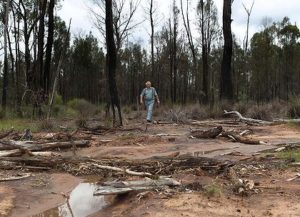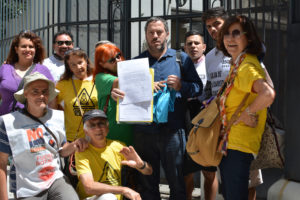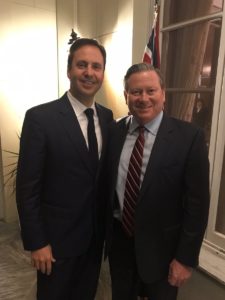Australian Company inflicting Human Rights Impacts in Latin America
The United Nations has also established the duty of the government to protect against human rights abuse by third parties, including business enterprises. They have published Guiding Principles on Business and Human Rights.
In this debate about human rights impacts in Australia by this industry and multinationals, there is a shocking example of an Australian Company impacting human rights in another country. Testimony was recently received regarding this precise issue – Report for the Human Rights Impact of Unconventional Gas from Latin America.
A summary of the issue is outlined below.
______________________
David Casey was the Managing Director of Eastern Star Gas. A company that in 2013 spilled 10,000l of polluted waste water in the Pilliga State Forest, in northern NSW, potentially contaminating 1.2ha of bushland and failed to report it.

Farmer Tony Pickard in the contaminated Pilliga woodland in north-western NSW, where coal seam gas companies are drilling. Photo: Jacky Ghossein
Eastern Star was taken over by Santos (although Santos already had shares in Eastern Star at the time of the incident), and David Casey had 8 Million shares in Santos at the time.
{Of course even this must have a connection to the unravelling Barnaby Joyce ICAC Sundae and here it is as a byline,,,In October 2007, Eastern Star Gas appointed former National Party leader and Deputy Prime Minister, John Anderson, as its chairman, to steer its proposed growth phase into a “major gas developer”. Anderson was working as the campaign manager for Mr Joyce. He left Eastern Star when it was sold to Santos. }
David Casey is now Managing Director of Petrel Energy who have controlling share of Schuepbach Energy. Uruguay’s State owned company ANCAP has allowed Schuepback/Petrel to carry out, exclusively and at its own risk, works related to the exploration and, eventually, production of hydrocarbons in areas granted for such purpose.
Much of this work undertaken by Petrel will be risking the Guarani Aquifer. This aquifer is one of the largest underground drinking water reserves in the world. It occupies approximately 1,200,000 km² southeast of South America and is shared by four countries: Uruguay, Argentina, Brazil and Paraguay. It is estimated that the aquifer could supply the world population for 200 years at a rate of 100 liters per habitant per day.
The concessions to this Shuepback/Petrel are given in an environment of total secrecy, denying Uruguayans the possibility of having public hearings where they can inform themselves and raise their doubts or opinions regarding the National Environment Directorate (DINAMA) giving permission to drill and cause risks to the aquifer and local farms and production through contamination with substances such as drill mud, inevitable failure of wells, and despite the geomorphological characteristics of the area in assoication with the aquifer.
Environmental groups have marched and demonstrated the peoples rejection of the permissions for Australian Company Petrel to drill and risk their aquifer. A letter was presented to the Embassy of Australia in Argentina, where it warns of the contamination risks of the Guarani Aquifer.

VS

David Casey at the Australian Consulate in Buenos Aires meeting their Minister for Trade Dec 2017
And then in Mid 2017, it happens,,,,Petrel Energy have an incident. It occurred where a large loss of sludge with chemicals in Cerro Padilla well, with an unknown impact on the aquifers in the area. According to the information available in the National Directorate of the Environment (Dinama), 125 thousand liters of sludge were lost (that is, more than 600 common tanks of 200 liters). DINAMA will sanction Petrel for the loss that was not immediately communicated to Dinama
Meanwhile, to add to the bizarre nature of this situation, further hightlights on the Petrel Energy hit parade include:
- one of the biggest shareholders in Petrel Energy and previous office holder Stephen Peter Mitchell and his father have the impressive credentials of being mentioned in senate estimates relating to not disclosing conflicts of interest https://www.aph.gov.au/~/
media/Committees/clac_ctte/ estimates/bud_1314/DoHA/ tabled_docs/18_060613_ DiNatale.pdf - Petrel Energy have ‘founded‘ the “Australian Studies Centre” in Uraguay https://asc.ort.edu.uy/
advisory-board-members - With such stellar advisory board members as Uraguay born Victorian MP Telmo Languiller
-
and Australia Unlimited – an Australian Government Sponsored brand – Australia Unlimited is an Australian Government initiative designed to share the stories of Australians and promote the intellectual, commercial and creative credentials of contemporary Australia to the world.
